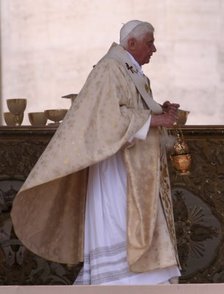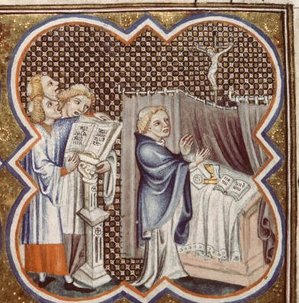 ALBANO, Italy, SEPT. 21, 2008 (Zenit.org).- Here is a translation of Benedict XVI' homily today at Mass in the Cathedral of Albano, Italy, near the papal summer residence at Castel Gandolfo. The cathedral's altar was dedicated at this Mass. (emphasis mine)
ALBANO, Italy, SEPT. 21, 2008 (Zenit.org).- Here is a translation of Benedict XVI' homily today at Mass in the Cathedral of Albano, Italy, near the papal summer residence at Castel Gandolfo. The cathedral's altar was dedicated at this Mass. (emphasis mine)
* * *
Dear Brothers and Sisters!
Today's celebration is so rich in symbols and the Word of God that has been proclaimed helps us to understand the meaning and value of what we are doing here. In the first reading we heard the story of Judas Macabeus' purification of the Temple and the dedication of the new altar of holocausts in 164 B.C., three years after the Temple had been profaned by Antiochus Epiphanes (cf. 1 Macabees 4:52-59). The Feast of the Dedication, which lasted eight days, was instituted to commemorate that event. This feast, initially linked to the Temple, where the people went in procession to offer sacrifices, was also connected with the illumination of the houses, and it survived in this form after the destruction of Jerusalem.
The sacred author rightly underscores the joy that characterizes that event. But how much greater, dear brothers and sisters, must our joy be, knowing that every day on this altar, that we are preparing to consecrate, the sacrifice of Christ is offered; on this altar he will continue to immolate himself, in the sacrament of the Eucharist, for our salvation and that of the whole world. In the Eucharistic mystery, that is renewed on every altar, Jesus is really present. His is a dynamic presence, which seizes us in to make us his, to assimilate us to him; it draws us with the power of his love, bringing us out of ourselves to unite us with him, making us one with him.
Christ's real presence makes each of us his "house," and we all together form his Church, the spiritual edifice of which St. Peter speaks. "Come to him," the apostle writes, "a living stone, rejected by human beings but chosen and precious in the sight of God, and, like living stones, let yourselves be built into a spiritual house to be a holy priesthood to offer spiritual sacrifices acceptable to God through Jesus Christ" (1 Peter 2:4-5).
Somewhat developing this beautiful metaphor, St. Augustine observes that through faith men are like wood and stone gathered from forests and mountains for building; through baptism, catechesis and preaching they are cut, squared, and filed down; but they only become the Lord's house when they are ordered by charity. When believers are reciprocally connected according to a determinate order, mutually and closely arranged and bound, when they are united together by charity they truly become the house of God that does not fear ruin (cf. Sermon 336).
It is therefore the love of Christ, the charity that "never ends" (1 Corinthians 13:8), the spiritual energy that unites those who participate in the same sacrifice and who nourish themselves from the same Bread broken for the salvation of the world. Is it indeed possible to be in communion with the Lord if we are not in communion with each other? How can we present ourselves divided and far from each other at God's altar? May this altar upon which the sacrifice of the Lord will soon be renewed be for you, dear brothers and sisters, be a constant invitation to love; always draw near to it with a heart open to the love of Christ and to spreading it, to receiving and bestowing forgiveness.
In this regard the Gospel passage that was proclaimed a little while ago offers us an important lesson for life (cf. Matthew 5:23-24). It is a brief but pressing and incisive call to fraternal reconciliation, a reconciliation that is indispensable if we are to present our offering worthily at the altar; it is a reminder that takes up again a teaching that is already quite present in the preaching of the prophets. The prophets vigorously denounced the uselessness of those acts of worship that lacked the correspondent moral dispositions, especially in relation to one's neighbor (cf. Isaiah 1:10-20; Amos 5:21-27; Micah 6:6-8). Every time that you come to the altar for the Eucharistic celebration your soul opens to forgiveness and fraternal reconciliation, ready to accept the apologies of those who have hurt you and ready, in turn, to forgive.
In the Roman liturgy the priest, having offered the bread and wine, bows toward the altar
 and prays in a low voice: "Lord, we ask you to receive us and be pleased with the sacrifice that we offer with humble and contrite hearts." The priest thus prepares to enter, together with the whole assembly of the faithful, into the heart of the Eucharistic mystery, into the heart of that celestial liturgy to which the second reading, taken from the Book of Revelation, refers.
and prays in a low voice: "Lord, we ask you to receive us and be pleased with the sacrifice that we offer with humble and contrite hearts." The priest thus prepares to enter, together with the whole assembly of the faithful, into the heart of the Eucharistic mystery, into the heart of that celestial liturgy to which the second reading, taken from the Book of Revelation, refers.
St. John presents an angel who offers "incense together with the prayers of all the saints, burning them on the altar of gold placed before the throne" of God (cf. Revelation 8:3). The altar of sacrifice becomes in a certain way the point of encounter between heaven and earth; the center, we could say, of the one Church that is at the same time heavenly and in pilgrimage on earth, where, in the midst of the persecutions of the world and God's consolations, the Lord's disciples proclaim his passion and death until he returns in glory (cf. Lumen Gentium, No. 8). Indeed, every Eucharistic celebration already anticipates the triumph of Christ over sin and the world, and shows in mystery the splendor of the Church, "immaculate bride of the immaculate Lamb, Bride that Christ loved and gave himself up for to make her holy (cf. Lumen Gentium, No. 6).
These reflections draw our attention to the rite that we are about to perform in this cathedral of yours, which we admire today in its renewed beauty and that we rightly desire to continue to make welcoming and decorous. It is a task that involves all of you and that, in the first place, calls upon the whole diocesan community to grow in charity and in apostolic and missionary dedication. Concretely, it is a matter of bearing witness with your life to your faith in Christ and the total confidence that you place in him.
It is also a matter of cultivating ecclesial communion that is, first of all, a gift, a grace, fruit of God's free and gratuitous love, that is, something divinely efficacious, always present and working in history, beyond all contrary appearances. Ecclesial communion is, however, also a task entrusted to the care of each individual. May the Lord grant you to live an evermore convinced and active communion, in cooperation and co-responsibility at every level: among the priests, the consecrated, and the laity, among the different Christian communities of your region, among the various lay groups.
****


Leave a comment